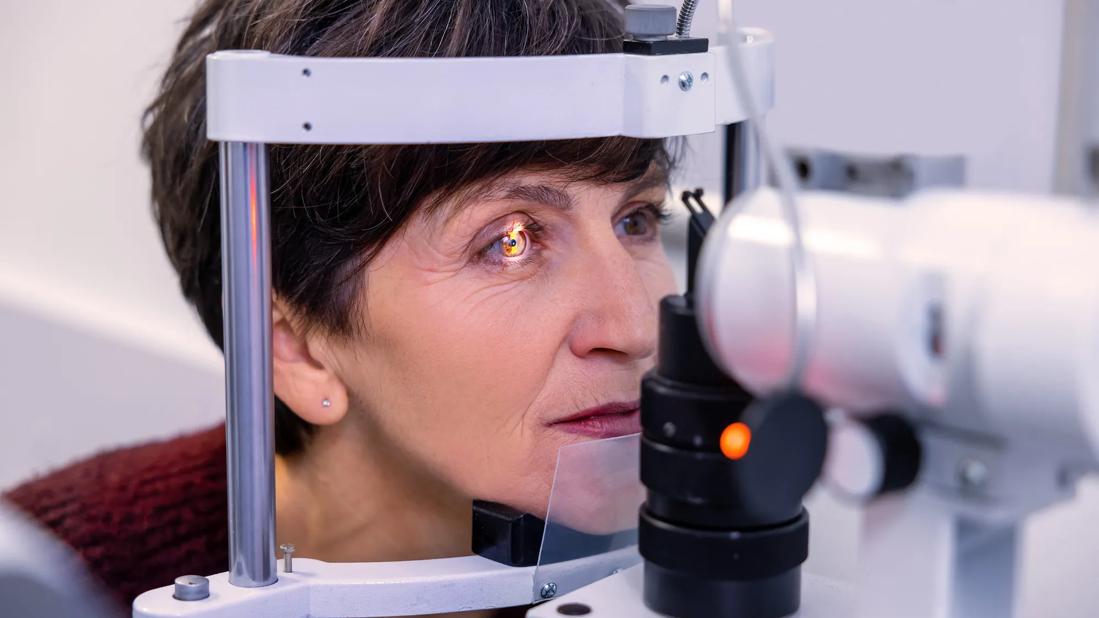Having a family history of glaucoma is one of the biggest risk factors for developing the condition yourself

Image content: This image is available to view online.
View image online (https://assets.clevelandclinic.org/transform/5d335a2e-d860-40e4-aae1-cb781457f997/glaucoma-eye-test-1451309892)
Person positioned in a slit lamp machine, receiving an eye exam
If you have an immediate biological relative who’s been diagnosed with glaucoma, take heed: It’s time to see an eye doctor for a check-up of your own.
Advertisement
Cleveland Clinic is a non-profit academic medical center. Advertising on our site helps support our mission. We do not endorse non-Cleveland Clinic products or services. Policy
“Certain groups of people are at higher risk for glaucoma, including people who have a family history of glaucoma — specifically in first-degree blood relatives, like a parent, child or sibling,” says glaucoma specialist Mary Qiu, MD.
Having a family history of glaucoma raises your risk of developing the condition by 4 to 9 times, compared to people who don’t have a family history of it. You’re up to 10 times more likely if you have a sibling who has the condition. And if it’s not managed, this common condition can cause permanent vision loss and even blindness.
A quick note about science: Though the terms are often used interchangeably, there’s a slight difference between “family history” and “hereditary.”
Advertisement
“One of the biggest risk factors for glaucoma is if it runs in your family,” adds glaucoma specialist Daniel Petkovsek, MD. “So, if you have a first-degree blood relative with glaucoma, you should definitely get your eyes checked.”
Let’s take a closer look at the most common types of glaucoma that can run in families:
Glaucoma is divided into two categories — open-angle and closed-angle — and family history is a risk factor for both types. It’s also divided into primary and secondary types.
“Primary glaucoma can happen for no particular reason, including genetics,” Dr. Petkovsek says. “Sometimes, it just runs in your family.” (The most common example is primary open-angle glaucoma.)
Secondary glaucoma, which occurs as the result of some other condition or injury, isn’t hereditary, but it can be a result of conditions that are, like uveitis (eye inflammation) and diabetes. This can raise your risk of developing it.
Talking to your biological family about their health history can help you better understand what conditions you might be at risk for, including glaucoma. But of course, not everyone has that option — and family histories aren’t always reliable.
For starters, you could have a relative who hasn’t revealed their glaucoma diagnosis. Or someone in your family could have glaucoma but not know it. In fact, one review of available research found that all around the world, it’s common for glaucoma to go undetected.
“Sometimes, there are no symptoms at all,” Dr. Qiu clarifies. “Eye pressure can increase slowly and gradually, without any pain. Vision loss, too, can start from the edge and slowly progress to the center so slowly that you don’t even notice.”
Just as it’s important to try to gather your family history if possible, the reverse is true, too. If you’re diagnosed with glaucoma, telling your relatives allows them to add this information to their own family health history record and prioritize their eye health.
Advertisement
Glaucoma can’t be prevented or cured, but catching and managing it early can keep you from losing any further vision.
“If you have a family history of glaucoma, you may want to see an eye doctor starting at a younger age than if you didn’t,” Dr. Petkovsek advises. “This allows us to check your eye pressure and your optic nerve to make sure you’re not developing glaucoma early.”
The American Academy of Ophthalmology (AAO) and American Glaucoma Society (AGS) both recommend a comprehensive eye exam at age 40, which includes glaucoma screening. But this can drop to age 35 or even younger if you have a family history of glaucoma.
You should have regular eye exams annually, at least. But depending on your other risk factors, your ophthalmologist may recommend more frequent appointments.
“If there are any early signs of glaucoma, they can be addressed right away,” Dr. Qiu affirms. “As long as you keep up with your doctor’s visits and follow the treatment plan they set for you, glaucoma is a very manageable condition.”
Advertisement

Sign up for our Health Essentials emails for expert guidance on nutrition, fitness, sleep, skin care and more.
Learn more about our editorial process.
Advertisement
Act quickly by locating the object, gently removing the debris and flushing your eye
High cholesterol can be genetic, but testing and treatment can lower your heart disease risk
Pink eye tends to start in one eye before spreading to the other, while allergies usually affect both eyes at the same time
A correct prescription helps your eyes see clearly — but as natural changes occur, you may need stronger or different eyeglasses
The differences are few, but ophthalmologists can perform eye surgeries and more complex procedures
Keep your eyes clean and avoid using makeup or contacts until you’re fully healed
Early morning red eyes can be a sign of several conditions, like dry eyes, allergies and eye strain
See an eye specialist if your pain isn’t going away and comes with other symptoms
Although it could be used as a moisturizer, this new trend is not recommended
Communicating clear limits helps protect your time, energy and emotional well-being
High cholesterol can be genetic, but testing and treatment can lower your heart disease risk